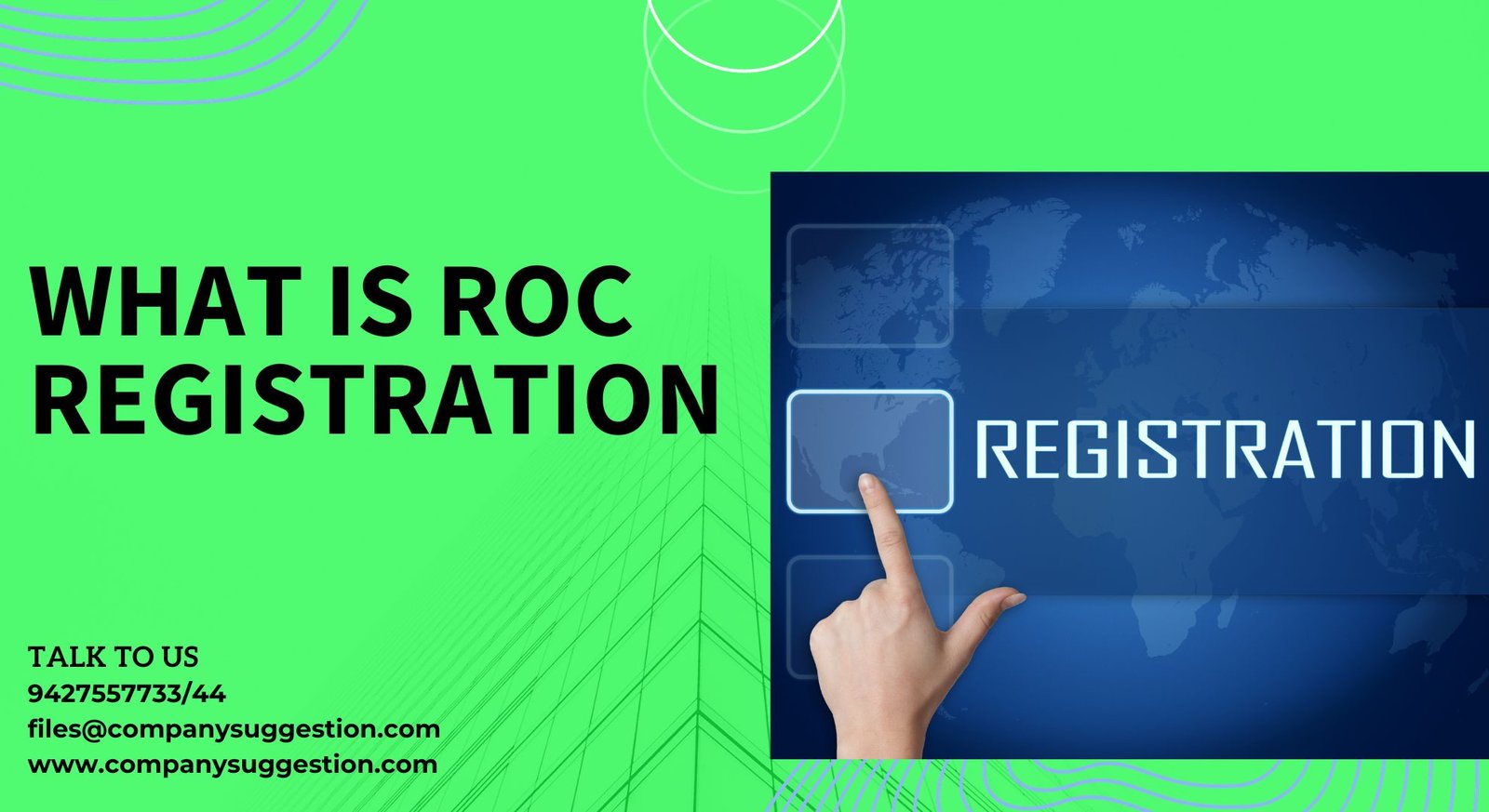What Is ROC Registration?
ROC registration, or Registration of Company, refers to the process by which a business entity is formally incorporated and registered under the provisions of the Companies Act (or equivalent legislation) in a specific jurisdiction. The registration is done with the Registrar of Companies (ROC), an office or agency appointed by the government to regulate and oversee the functioning of distinct from its owners.
ROC registration provides several advantages, including legal recognition, limited liability protection for shareholders, access to legal remedies in case of disputes, and credibility in the business market. However, it also entails responsibilities such as filing regular financial statements, annual reports, and adhering to corporate governance standards as mandated by the regulatory authorities.
Functions of ROC
The Registrar of Companies (ROC) plays a central role in the regulation and administration of companies and corporate affairs within a specific jurisdiction. But generally include the following functions :
- Company Incorporation: The ROC is responsible for the process of incorporating new companies. This involves approving the company’s name, verifying its documents, and issuing the certificate of incorporation.
- Company Name Approval: The ROC ensures that new company names are unique and not similar to existing companies. It approves or rejects proposed company names accordingly.
- Maintaining the Register: The ROC maintains a register of all companies registered within its jurisdiction. This register includes details about the company’s directors, shareholders, registered office address, and other statutory information.
- Regulatory Compliance: The ROC monitors and enforces compliance with legal and regulatory requirements. This includes ensuring companies file their annual returns, financial statements, and other necessary documents on time.
- Corporate Governance: The ROC promotes good corporate governance practices among registered companies. It monitors adherence to corporate laws and regulations related to governance and ethics.
- Approving Changes: Any significant changes within a company, such as changes in the company’s structure, directors, or registered office address, often require approval from the ROC.
- Public Access to Information: The ROC serves as a repository of information about registered companies. Certain information, such as the company’s registered address and directors, is accessible to the public.
- Investigations and Legal Actions: The ROC has the authority to conduct investigations into a company’s affairs if there are suspicions of misconduct or non-compliance with the law. It can also initiate legal actions against companies or their directors in case of violations.
- Dissolution and Striking Off: The ROC oversees the process of dissolving companies, either through voluntary means (by the company’s decision) or compulsory means (by the ROC’s decision). It can also strike off companies from the register if they fail to comply with regulations.
- Handling Company Records: The ROC maintains and preserves company records and documents. These records are often available for public inspection, subject to certain restrictions and privacy laws.
ROC Registration Process
The ROC registration process are consider the specific steps and requirements depend on the legal framework of the respective jurisdiction. However, I can provide a general outline of the typical ROC registration process for incorporating a company. Here’s a general overview:
1. Choose a Business Structure:
Determine the type of business entity you want to register, such as a private limited company, public limited company, or limited liability partnership. The choice of structure will affect the registration process and legal obligations.
2. Name Approval:
Propose a unique name for your company. Most jurisdictions have online tools or forms for name availability checks. Once the name is approved, it is usually reserved for a specific period during which you need to complete the registration process.
3. Prepare Documents:
Prepare the necessary documents, which typically include:
- Memorandum of Association (MOA): It contains the company’s objectives and powers.
- Articles of Association (AOA): It outlines the rules for the company’s internal management.
- Declaration of Compliance: A legal declaration stating that all requirements of the Companies Act have been complied with.
- Details of Directors and Shareholders: Provide personal information and addresses of directors and shareholders.
4. Fill out Application Forms:
Complete the required application forms provided by the ROC. These forms usually include information about the company, its directors, shareholders, and registered office address.
5. Submit Documents and Fees:
Submit the completed application forms along with the required documents to the ROC. You will also need to pay the registration fees.
6. Verification and Approval:
The ROC will review your documents and application. If everything is in order and complies with the regulations, the ROC will approve the registration and issue a Certificate of Incorporation. This certificate legally establishes your company.
7. PAN and TAN Application:
After incorporation, apply for Permanent Account Number (PAN) and Tax Deduction and Collection Account Number (TAN) for tax purposes. These are usually obtained from the tax authorities in your country.
8. Post-Incorporation Compliance:
After registration, your company will need to comply with various post-incorporation requirements, such as filing annual returns, maintaining accounting records, and conducting regular meetings as per the legal requirements.
Benefits of ROC Registration
Registering a company with the Registrar of Companies (ROC) offers several benefits, both to the business and its stakeholders. Here are some of the key advantages of ROC registration:
1. Legal Recognition:
Separate Legal Entity: A registered company is considered a legal entity distinct from its owners.
Limited Liability: Shareholders’ liability is limited to the extent of their shareholdings. Their personal assets are generally protected in case the company incurs debts or faces legal issues.
2. Credibility and Trust:
Market Credibility: ROC registration lends credibility to the business, fostering trust among customers, suppliers, and potential partners.
Access to Funding: Registered companies often find it easier to secure funding from banks, investors, and financial institutions, as they are considered more trustworthy and stable.
3. Business Opportunities:
Government Contracts: Many government contracts and tenders are open only to registered companies, providing access to lucrative business opportunities.
International Expansion: Registered companies can easily engage in international trade and expand their business globally.
4. Tax Benefits:
Tax Efficiency: Registered companies may enjoy various tax benefits, incentives, and exemptions provided by the government to promote economic growth.
Tax Deductions: Businesses can claim various deductions and exemptions on taxes paid, reducing the overall tax liability.
5. Legal Protection and Compliance:
Legal Protection: The company and its directors enjoy legal protection. Disputes and legal actions are generally directed at the company rather than the individual directors.
Compliance: ROC registration ensures that the company complies with legal and regulatory requirements, fostering good corporate governance practices.
6. Ownership and Transferability:
Ownership Transfer: Ownership in a registered company can be easily transferred or sold, allowing for smooth succession planning and business continuity.
Perpetual Succession: A registered company enjoys perpetual succession, meaning the company continues to exist even if its members change over time.
7. Employee Benefits:
Employee Confidence: Being associated with a registered company boosts employee confidence in job security and career prospects.
Employee Stock Options: Registered companies can offer employee stock options, providing employees with opportunities to become shareholders.
8. Intellectual Property Protection:
Brand Protection: ROC registration can protect your brand name and logo under intellectual property laws, preventing others from using similar names or symbols.
9. Access to Legal Remedies:
Legal Recourse: In case of disputes or legal issues, registered companies have access to legal remedies and can take legal action against infringing parties.
10. Transparency and Accountability:
Transparency: ROC registration enforces transparency in financial reporting and corporate activities, enhancing investor confidence.
Accountability: Registered companies are accountable to regulatory authorities, ensuring adherence to ethical business practices.
ROC Compliances
Registrar of Companies (ROC) compliance refers to the set of rules and regulations that companies registered under the Companies Act or equivalent legislation must adhere to in a specific jurisdiction. These regulations are put in place to ensure transparency, accountability, and legal operation of companies. ROC compliances typically involve various filings, disclosures, and other obligations that companies need to fulfill on an ongoing basis. Here are some ROC compliances:
1. Annual Filings:
Annual Return: Companies are required to file their annual returns with the ROC. This includes information about the company’s shareholders, directors, and financial statements.
Financial Statements: Companies need to file their audited financial statements, including the balance sheet, profit and loss statement, and cash flow statement.
2. Board and Shareholders’ Meetings:
Board Meetings: Companies are required to hold regular board meetings. Minutes of these meetings need to be maintained and filed with the ROC.
Shareholders’ Meetings: Annual General Meetings (AGMs) must be held within a specified time after the end of the financial year. Resolutions passed during these meetings need to be filed.
3. Changes in Company Structure:
Change in Directors: Any change in the board of directors, appointment, or resignation of directors needs to be filed with the ROC.
Change in Registered Office: If a company changes its registered office within the same city or from one city to another, it needs to inform the ROC.
4. Statutory Registers:
Maintenance of Registers: Companies are required to maintain various statutory registers, including the register of members, register of directors, and register of charges.
Regular Updating: These registers need to be regularly updated and made available for inspection by the authorities.
5. Compliance Certificates:
Compliance Certificate: Companies need to obtain compliance certificates from practicing company secretaries or chartered accountants and file them with the ROC.
Secretarial Audit: A secretarial audit of the company’s records and compliance with laws and regulations might be required periodically.
6. Taxation and Financial Compliance:
Income Tax Returns: Companies need to file their income tax returns with the tax authorities.
GST Returns: If applicable, Goods and Services Tax (GST) returns need to be filed regularly.
Other Financial Compliances: Compliance with other financial laws and regulations specific to the industry or jurisdiction.
7. Disclosure Requirements:
Director’s Report: The director’s report, including information about the company’s performance and future outlook, needs to be prepared and filed with the ROC.
Annual Financial Statements: These statements, including balance sheets and profit and loss accounts, need to be disclosed in the company’s annual report.
8. Event-Based Compliances:
Changes in Capital Structure: Any changes in the company’s share capital, such as issuance of new shares or buyback, need to be filed with the ROC.
Charge Creation or Satisfaction: If a company creates, modifies, or satisfies a charge (security interest), it must be filed with the ROC.
Company Suggestion provides services of Compliances services along with same Income Tax Returns, GST Registration or Returns etc.
Our experts of team will guide you related to compliances of Companies, Firms and other entities if you have any doubt regarding this, then you can send your doubts on company suggestion and clear it.













